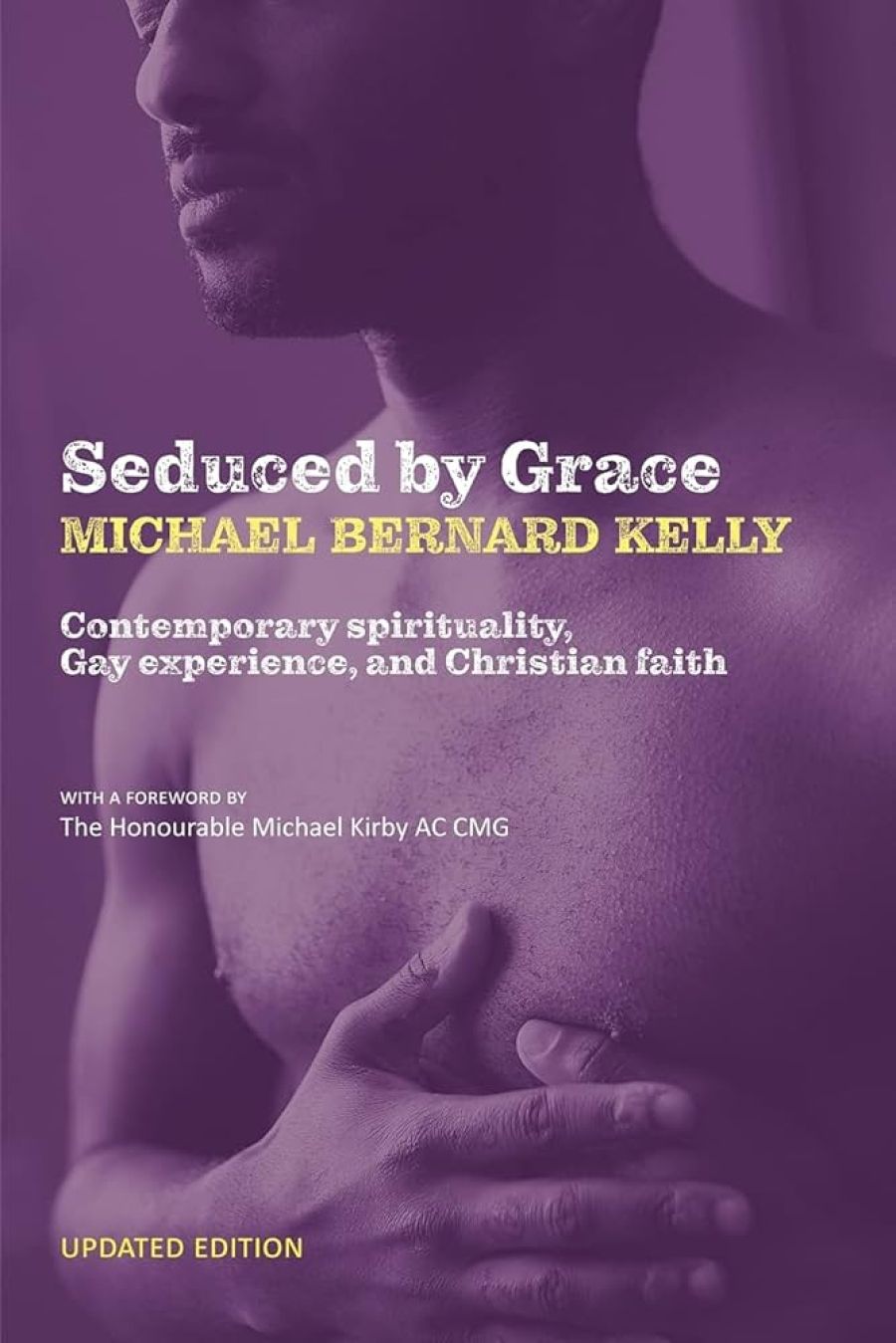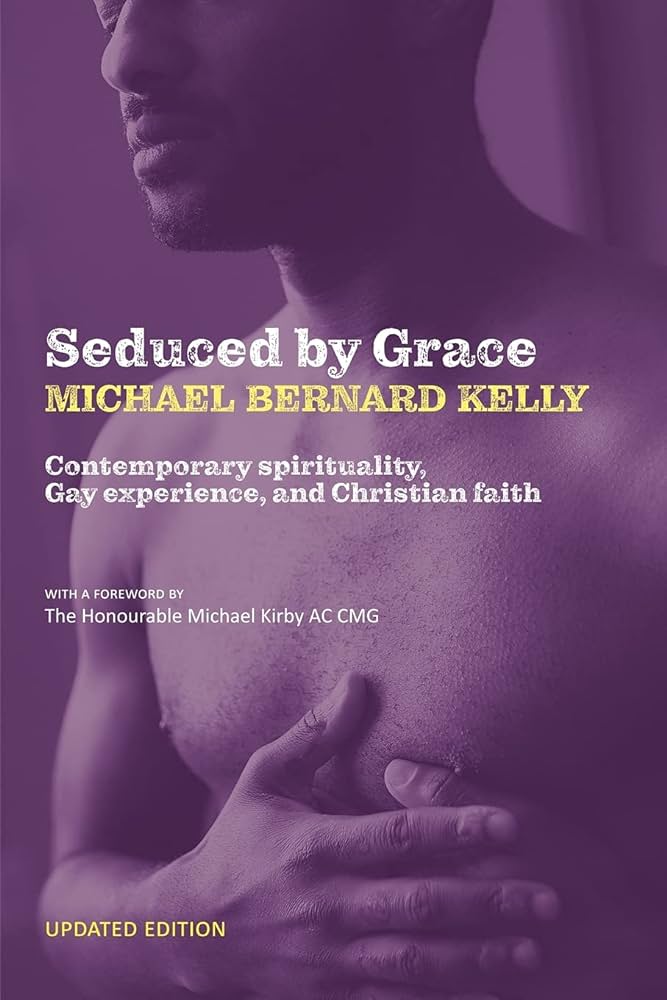
- Free Article: No
- Contents Category: Religion
- Review Article: Yes
- Article Title: Over the spiritual rainbow
- Online Only: No
- Custom Highlight Text:
Michael Bernard Kelly is perhaps best known for his association with the Rainbow Sash Movement, a group of gay and lesbian Catholics and their supporters who have, from time to time, been refused Holy Communion when attending Mass wearing the rainbow sash. Cardinal Pell, formerly archbishop of Melbourne, now of Sydney, has been a particular target. Kelly describes himself as the movement’s ‘writer, spokesperson and co-convenor’. For him the sash is ‘a symbol of gay visibility and dignity within the Catholic Church’, and the movement challenges what he sees as the hypocrisy of the Church’s continuing condemnation of homosexuality.
- Book 1 Title: Seduced by Grace
- Book 1 Subtitle: Contemporary spirituality, gay experience and Christian faith
- Book 1 Biblio: Clouds of Magellan, $24.95 pb, 258 pp
- Book 1 Cover Small (400 x 600):

- Book 1 Cover (800 x 1200):

In Seduced by Grace, a diverse collection of his writings over the last ten years, Kelly makes no apology for taking on his own church. Gay Catholic organisations, with names such as ‘Dignity’ and ‘Acceptance’, can sound a bit mealy-mouthed. Kelly, on the other hand, vigorously asserts what gays and lesbians have to offer church and society in terms of their ‘intrinsic goodness’, ‘life-giving love’, creativity and ‘earthy humanness’.
Kelly concedes that Catholic teaching on sexuality has been forced to make some changes over the last forty years. Procreation is no longer the only justification for sexual intercourse: pleasure in ‘unitive love’ is now actually permissible. Infertile couples may marry and have sex; fertile couples may use what used to be called the ‘rhythm method’ of ‘natural’ contraception. But while the church now calls for homosexuals to be treated with ‘compassion, sensitivity and respect’, it still regards homosexuality as ‘an orientation to intrinsic moral evil’. And for Kelly this unrelenting, anachronistic attitude is bound up with the church’s inherited culture of ‘sacred celibacy’.
What is most subversive about Kelly’s approach is the parallel he draws between spiritual and sexual experience:
This longing for communion and transcendence is the essence of spirituality; it is what I seek when I pray, when I try to live out in service, what I call true holiness when it matures in a human person. This is the same mystery that I long for in sex, in the daily reality of my life, in my choices, relationships and dreams.
Gay and lesbian people, ‘who have borne most cruelly the brunt of the Church’s rejection of the sexual’, are especially called to bear witness to ‘our experience of the Divine in flesh’.
Some of Kelly’s essays are more specifically addressed to a gay, usually Catholic, audience. So, for example, he takes Luke’s Gospel account of the two disciples who, ‘sad and confused’ after the crucifixion, set out to walk from Jerusalem to Emmaus. Jesus joins them and walks with them, though at first they do not recognise him. They unburden their hearts to the stranger, but it is only when they invite him into their home and break bread with him that the truth of the encounter dawns on them. And knowing Luke’s reputation for being concerned with society’s outsiders, Kelly invites his gay audience to imagine that the two disciples are members of their ‘tribe’. So while on the one hand he is attacking the bigotry of the official Church, Kelly is at the same time urging gay Catholics to own their faith without guilt.
So focused is Kelly on the Church of Rome and the Rainbow Sash Movement that he seems to have little interest in gays and lesbians in other churches – or, indeed, other religions for that matter. The one exception is that in 2004 he realises that ‘the Anglicans are having our fight for us at the moment – and they are fighting openly, painfully and publicly’. This was the time when the American Episcopal Church’s consecration of the openly gay Gene Robinson as bishop had begun to cause a schism in the Anglican communion.
With a collection such as this, cobbled together from contributions to the press, straight and gay, and from papers and talks, there is inevitably a scattergun effect. One moment we are sampling Liberation Theology in Nicaragua, the next we are in California plunging into the Body Electric Movement, which somehow encompasses ‘genital massage, sex play and divine presence’. Yet what comes through is a kind of joyful innocence as Kelly seeks to make these connections between body and spirit.
What, for me at least, is missing in Seduced by Grace is an insider’s critique of Australian gay and lesbian culture. In his consciousness-raising mode, Kelly is optimistic: ‘the Holy Spirit is bursting out, bubbling up, pouring forth in the lives of gay and lesbian people.’ Well, maybe. But there is also the consumerist commercialism of much of the gay scene. And while the gay community achieved a painful maturity through the years of the AIDS crisis, that now seems to be under some threat.
I must confess, too, to having a lurking reservation about the rainbow sash. Gay and lesbian Catholics certainly have a right, even duty, to challenge the unchristian obduracy of the likes of George Pell. But the rainbow sash, with its suggestion of fancy dress, marks out its wearers as different, whereas the point, surely, is that in coming to the communion table we are all one. Somehow the rainbow sash risks obscuring the real issue.
Seduced by Grace comes with an eloquent foreword from the patron saint of the gay community, Justice Michael Kirby, who reinforces the central message of the book: ‘We love and accept the universal message of Jesus … We deny anyone the right to take it from us.’ Michael Bernard Kelly’s passionate exploration of that message will seem more relevant to many readers than the Catholic hierarchy’s inquisitorial moralism.


Comments powered by CComment